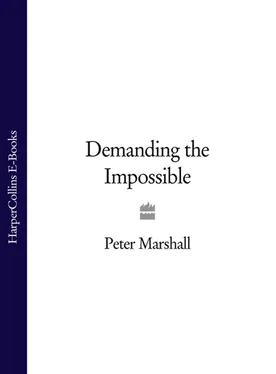To be governed is to be watched over, inspected, spied on, directed, legislated, regimented, closed in, indoctrinated, preached at, controlled, assessed, evaluated, censored, commanded; all by creatures that have neither the right, nor wisdom, nor virtue … To be governed means that at every move, operation, or transaction one is noted, registered, entered in a census, taxed, stamped, priced, assessed, patented, licensed, authorized, recommended, admonished, prevented, reformed, set right, corrected. Government means to be subjected to tribute, trained, ransomed, exploited, monopolized, extorted, pressured, mystified, robbed; all in the name of public utility and the general good. Then, at the first sign of resistance or word of complaint, one is repressed, fined, despised, vexed, pursued, hustled, beaten up, garroted, imprisoned, shot, machine-gunned, judged, sentenced, deported, sacrificed, sold, betrayed, and to cap it all, ridiculed, mocked, outraged, and dishonoured. That is government, that is its justice and its morality! 22
Bakunin reserved some his finest rhetoric for his condemnation of the State for crushing the spontaneous life of society. But he too was not always consistent. In the First International, Bakunin and his supporters allowed the terms ‘regenerate State’, ‘new and revolutionary State’, or even ‘socialist State’ to stand as synonyms for ‘social collective’. But aware of the ambiguity which could be exploited by the authoritarian socialists and Marxists, they went on to propose fédération or solidarisation of communes as a more accurate description of what they wanted to see to replace the existing State. In his speech at the Basel Congress of 1869, Bakunin thus made clear that he was voting for the collectivization of social wealth by which he meant ‘the expropriation of all who are now proprietors, by the abolition of the juridical and political State which is the sanction and sole guarantor of property as it now is’. As to the subsequent form of organization, he favoured the solidarisation of communes because such solidarisation entails the ‘organization of society from the bottom up’. 23
The practice amongst some anarchists to confuse the government and the State appears most clearly in Malatesta. In his pamphlet Anarchy (1891), he defined the State as
the sum total of political, legislative, judiciary, military and financial institutions through which the management of their affairs, the control over their personal behaviour, the responsibility for their personal safety, are taken away from the people and entrusted to others who, by usurpation or delegation, are vested with the powers to make the laws for everything and everybody, and to oblige the people to observe them, if need be, by the use of collective force.
But he added that in this sense the word State means government , or to put it another way, it is ‘the impersonal, abstract expression of that state of affairs personified by government’. Since the word State is often used to describe a particular human collectivity gathered in a particular territory, and to mean the supreme administration of a country, he preferred to replace the expression ‘abolition of the State’ with the ‘clearer and more concrete term abolition of government ‘. 24
Kropotkin was concerned about abolishing both the government and the State. He defined anarchism as the ‘No government system of socialism’ and as ‘a principle or theory of life and conduct under which society is conceived without government’. 25 In his work on the origins of The State (1897), Kropotkin distinguished between the State and government. He does not consider all governments to be equally bad for he praises the medieval cities and their governmental institutions, with their assemblies, elected judges, and military force subordinate to the civil authority. But when the State emerged it not only included the existence of a power situated above society like the government but also a ‘ territorial concentration and a concentration of many or even all functions of society in the hands of a few ’. It implies some new relationships between members of society which did not exist before the formation of the State. It had been the historical mission of the State ‘to prevent the direct association among men, to shackle the development of local and individual initiative, to crush existing liberties, to prevent their new blossoming – all this in order to subject the masses to the will of minorities’. 26
This century the anarchist critique of the State has become more sophisticated. Gustav Landauer has suggested that ‘the State is a condition, a certain relationship between human beings, a mode of behaviour; we destroy it by contracting other relationships, by behaving differently’. Only when people make the existing connection between them a bond in an organic community can the legal order of the State be made obsolete. 27
More recently, Murray Bookchin has argued persuasively that the State is not merely a constellation of bureaucratic and coercive institutions but also a state of mind, ‘an instilled mentality for ordering reality’. In liberal democracies this century, its capacity for brute force has been limited, but it continues to have a powerful psychological influence by creating a sense of awe and powerlessness in its subjects. Indeed, it has become increasingly difficult to fix its boundaries and the line between the State and society has become so blurred that now ‘the State is a hybridization of political with social institutions, of coercive with distributive functions, of highly punitive with regulatory procedures, and finally of class with administrative needs’. 28
It is on the issue of the State that anarchists part company with their liberal and socialist allies. Liberals maintain that a State as a compulsory legal order is necessary to protect civil liberties and rights, to deal with disputes and conflicts in society with an unfettered economy. As the liberal thinker L. T. Hobhouse wrote:
The function of State coercion is to override individual coercion, and, of course, coercion exercised by any association of individuals within the State. It is by this means that it maintains liberty of expression, security of person and property, genuine freedom of contract, the rights of public meeting and association, and finally its own power to carry out common objects undefeated by the recalcitrance of individual members. 29
Anarchists argue, on the other hand, that even the most minimal ‘night-watchman’ State advocated by modern libertarians would be controlled by the rich and powerful and be used to defend their interests and privileges. However much it claims to protect individual rights, the government will always become ‘an instrument in the hands of the ruling classes to maintain power over the people’. 30 Rather than providing healthy stability, it prevents positive change; instead of imposing order, it creates conflict; where it tries to foster enterprise, it destroys initiative. It claims to bring about security, but it only increases anxiety.
Although anarchists feel that representative democracy is preferable to monarchy, aristocracy or despotism, they still consider it to be essentially oppressive. They rebut the twin pillars of the democratic theory of the State – representation and majority rule. In the first place, no one can truly represent anyone else and it is impossible to delegate one’s authority. Secondly, the majority has no more right to dictate to the minority, even a minority of one, than the minority to the majority. To decide upon truth by the casting up of votes, Godwin wrote, is a ‘flagrant insult to all reason and justice’. 31 The idea that the government can control the individual and his property simply because it reflects the will of the majority is therefore plainly unjust.
Читать дальше












